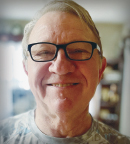Although there is no history of cancer in my family, I guess it isn’t surprising that I would develop an aggressive form of melanoma on my scalp after years of ultraviolet radiation from sun exposure. Still, getting the diagnosis was devastating.
I first noticed a small lump on the top of my head in October 2017. By November, the mass had grown to the size of a nickel and then rapidly to the size of a quarter the following month. What really scared me though was the mass started to bleed, sometimes uncontrollably. And one night at dinner, I was sure I felt a piece of the mass break off and drop to a lymph node in my neck. I instinctively knew whatever this lump was, it was serious. A tissue biopsy confirmed the mass was an aggressive type of melanoma.

“Without the effort of these researchers and my medical team, I have no doubt I would not be here telling you my story.”— Johnny Borgstrom
Tweet this quote
Over the next 3 months, from January to March 2018, I had three surgeries, including one that found the melanoma had, in fact, spread to my lymph nodes. An imaging scan of my body also found the cancer had spread to both lungs. After a lot of thought, I decided to make the 12-hour drive from my home in Big Cabin, Oklahoma, to The University of Texas MD Anderson Cancer Center, Houston, to get a second opinion. That decision, I’m convinced, saved my life.
Taking a Chance
A lung biopsy suggested by my oncologist, Hussein A. Tawbi, MD, PhD, Professor and Director of Personalized Cancer Therapy in the Department of Melanoma Medical Oncology at The University of Texas MD Anderson Cancer Center, confirmed that I had stage IV melanoma. Dr. Tawbi asked me if I would consider enrolling in a clinical trial, RELATIVITY-047 (ClinicalTrials.gov identifier NCT03470922), investigating a combination regimen of the immune checkpoint inhibitors nivolumab and relatlimab-rmbw in patients with advanced-stage melanoma.
I knew that people diagnosed with late-stage melanoma usually don’t live very long. I also knew that I did not want to be treated with conventional chemotherapy and risk spending what remaining months I had left feeling sick and debilitated. And, I thought, even if this clinical trial doesn’t save my life, if I can contribute to saving the life of a child or another adult with melanoma with the information gleaned from this trial, it was worth taking the chance.
In June 2018, I started receiving the investigational therapy. About 11 months later, the masses in my lungs had begun to shrink, and 1 month later, they completely disappeared. Although Dr. Tawbi felt comfortable taking me off the trial, he asked if I would continue participating in the study for the full 2 years. I immediately agreed, because I felt staying on the treatment would give me a better shot at a durable remission. I also wanted to fulfill my obligation to contribute to the success of this study.
In early May 2020, I had my last treatment. I’ve been cancer-free ever since. (Editor’s Note: In March 2022, the U.S. Food and Drug Administration approved nivolumab and relatlimab-rmbw for the treatment of adult and pediatric patients with unresectable or metastatic melanoma.1)
Helping Others Survive Cancer
When I started on this cancer journey, I told my wife that cancer has given me the perspective to want to help other survivors in any way I can. I was also determined to remain positive throughout survivorship, for however long that might be. During my treatment, I experienced some side effects to my heart, thyroid, and eyes, which have disappeared since I’ve stopped the therapy. But even if the treatment failed to stop disease progression, I was prepared to die. My faith in God is so strong that I never worried about the outcome.
Living My Life
Dr. Tawbi is the most positive person I have ever met and his attitude helped my family and me get through the most difficult year of our lives, and I never felt alone in this journey. He, along with the rest of my medical team, have become extended members of my family. In addition to my oncology team, I’m also grateful to the researchers who developed the treatment that saved my life and the lives of many others with advanced-stage melanoma. Their effort has made me an enthusiastic advocate for clinical research, and I’m making my voice heard to federal policymakers about the importance of funding cancer research. Without the effort of these researchers and my medical team, I have no doubt I would not be here telling you my story.
When my cancer treatment ended, Dr. Tawbi told me to go home and live my life. That is exactly what I’m doing.
REFERENCE
1. U.S. Food and Drug Administration: FDA approves Opdualag for unresectable or metastatic melanoma. Available at www.fda.gov/drugs/resources-information-approved-drugs/fda-approves-opdualag-unresectable-or-metastatic-melanoma. Accessed January 31, 2023.
Mr. Borgstrom lives in Big Cabin, Oklahoma.
Editor’s Note: Columns in the Patient’s Corner are based solely on information The ASCO Post received from patients and should be considered anecdotal.

